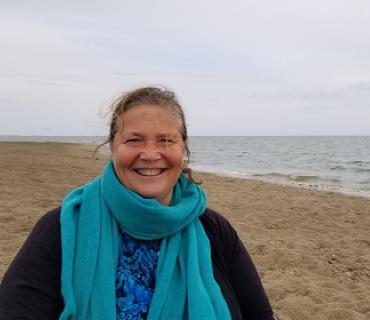
Amanda Vincent
-
Email
-
Office phone
-
Website
-
Research areaEcology
-
Lab Website
Dr. Amanda Vincent is driven by a determination to protect our oceans. As well as tackling research on pressing problems, Dr. Vincent also mobilizes conservation action to improve the status of marine species and habitats. Given that there is no such thing as perfect advice, she is keen to act on the best available information, making recommendations in the spirit of adaptive management. She works to tell good news stories, always seeking solutions that generate optimism and action by the largest possible number of people. Dr. Vincent and her Project Seahorse team have made measurable gains in marine conservation, with encouraging outcomes and impacts from their work. In 2020 she became a Fellow of the Royal Society of Canada.
Dr Vincent holds a Ph.D. from the University of Cambridge, England and a Hons. B.Sc. from the University of Western Ontario in Canada. She was a Visiting Fellow in Sweden and Germany (1990-1991) and a Senior Research Fellow at the University of Oxford, England (1991-1996). She was on faculty at McGill University, Montreal, Canada (1996-2002), where she was named a William Dawson Scholar in 2000. The same year, Dr. Vincent was named a Pew Fellow in Marine Conservation, the world's pre-eminent award in that field. She moved to UBC in 2002, with a Canada Research Chair (Tier II) in Marine Conservation.
Dr. Vincent was the first person to study seahorses underwater, the first to document the extensive trade in these fishes and the first to initiate a seahorse conservation project. Her team’s research and advocacy work for marine conservation have earned Dr. Vincent the following awards and accolades, among others: Whitley Award in Animal Conservation (1994); Grand Prix International pour l'Environment Marin (Conféderation Mondiale des Activités Subaquatiques: 1997), Rolex Award for Enterprise (1998); TIME magazine Leader for the 21st Century (1999); La Presse Personality of the Year (2000); Chevron Conservation Award (2005); Yves Rocher Foundation Woman of the Earth (2007), Le Cren Medal (2018). In 2020, she became the first marine conservation to win the world’s leading animal conservation prize (Indianapolis Prize). She was also one of six global finalists for the Indianapolis Prize for Animal Conservation in 2010 and 2016.
In 1996, Dr. Vincent co-founded and still directs Project Seahorse, an interdisciplinary and international organisation committed to conservation and sustainable use of the world’s coastal marine ecosystems. The group engages in connected research and management at scales ranging from community initiatives to international accords. Collaborating with stakeholders and partners, team members use seahorses to focus efforts in finding marine conservation solutions. Project Seahorse undertakes biological and social research, empowers local communities, establishes marine protected areas, manages small-scale fisheries, restructures international trade, promotes integrated policy, and advances environmental understanding.
Dr. Vincent is very active in marine management and policy issues. She is Chair of the IUCN SSC Seahorse, Pipefish and Seadragon Group. She is the marine representative on the IUCN’s International Red List Committee and is the Chair of its Marine Conservation Committee. From 2000-2004, she chaired the Syngnathid Working Group for the 180-nation Convention on the International Trade in Endangered Species (CITES). Project Seahorse played a pivotal role in the landmark CITES decision to begin regulating international trade in marine fishes. In addition, Dr. Vincent has held special responsibility for coastal species as a member of the Steering Committee of the IUCN Species Survival Commission.
Dr. Vincent has written hundreds of scientific papers, technical reports, popular articles and policy briefings. She published the first monograph on the international trade in seahorses and has also co-authored a book on seahorses. Her work has been documented in five full-length television programmes, and much other media coverage globally. Her background includes extensive rough travel through more than 60 countries. Project Seahorse research and management initiatives are supported by not-for-profit organisations, government, private enterprise, research councils and individuals.
Research Interests
- International conservation policy
- Trade in marine life for non-food purposes (e.g. medicines, aquarium pets, and curios)
- Regulation of trawling and bycatch
- Marine protected areas and zoning
- Small scale fisheries management, with particular attention to gender issues
- Community-based coastal resource management, particularly in Southeast Asia
- Seahorses, pipefishes, pegasid fishes
- Reproductive ecology of fishes and other marine organisms, and its evolution
Research Projects
- The role of CITES and other international agreements in marine conservation
- Improving the conservation status of seahorse populations globally
- Implementation of a landmark CITES Appendix II listing for marine fishes
- Mitigating the impacts of shallow-water bottom trawling on non-target animals
- Developing citizen science that democratizes conservation action
- Mining multiple data sets on many no-take marine reserves in the Philippines
- Analyses of seahorse trade in many countries of Asia and beyond (e.g. Australia, Senegal, East Africa, Central America).
- Assessing the IUCN Red List status of Syngnathiform and Gasterosteiform fishes.
- Studies of exploited seahorse populations in Malaysia, Philippines, Thailand, Vietnam, and more.
- Spatial planning for seahorses globally and in China.
- The relative costs and benefits for trade bans versus management for sustainable use for marine wildlife.
- The application of SMS texting to conservation.
- The impacts of small scale fisheries in the Philippines.
- The role of women in fisheries and marine management in the Philippines.
- Global analysis of seahorse bycatch in multiple gears, as a model system.
- The effect of MPAs on mobile invertebrates.
- Fostering marine conservation in traditional Chinese medicine
Previous projects
- Implementation of community-based marine reserves in the Philippines
- Understanding extraordinary fisheries for non-food purposes (e.g. leather, curios, natural products, aquarium trade)
- Dispersal and movement in fragmented populations of coral reef fish species
- UBC Sustainable Seafood Project
Teaching Experiences / Current Courses
- BIOL 420: Ocean conservation and sustainability
- BIOL 548f: Public outreach for scientists
- FISH 520: Fisheries Conservation, Governance, and Evaluation
- FISH 503: Science and society in aquatic policy